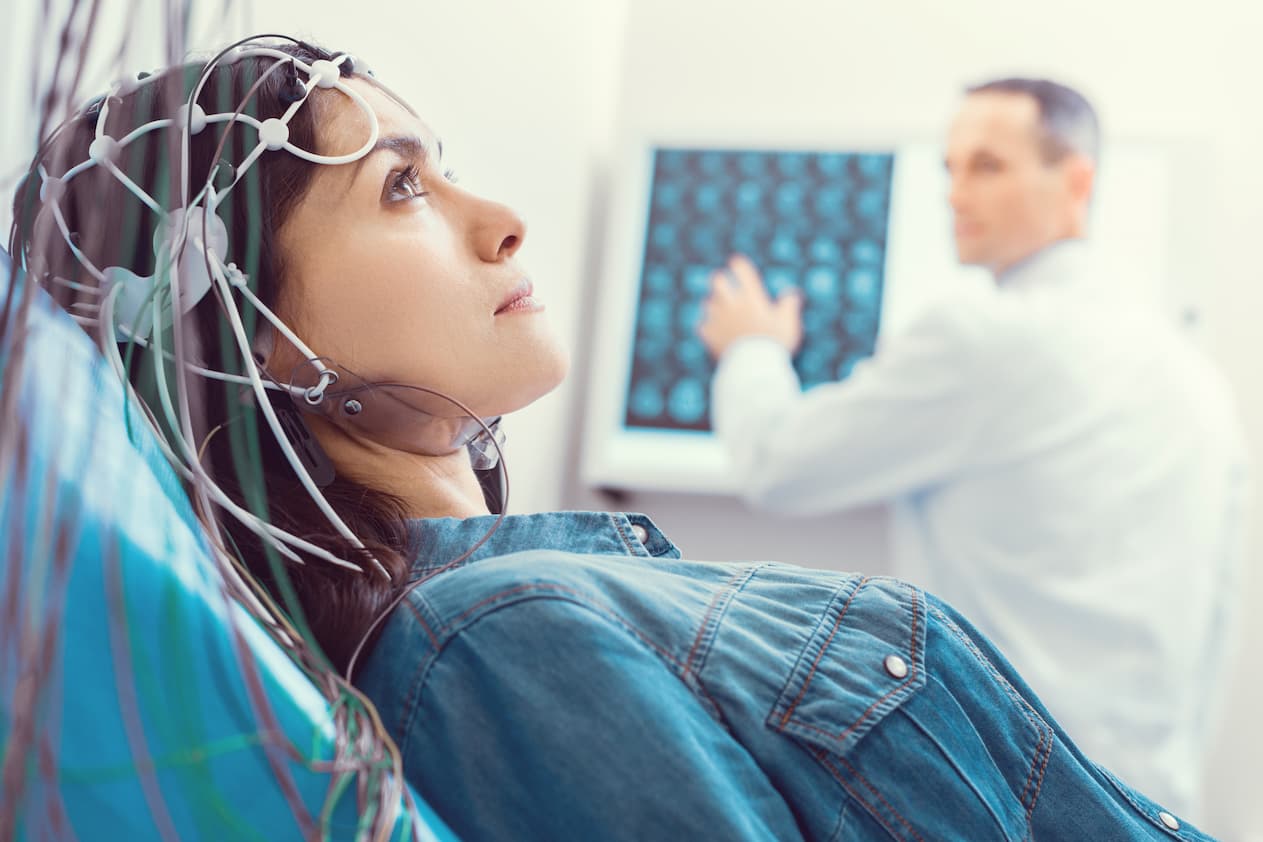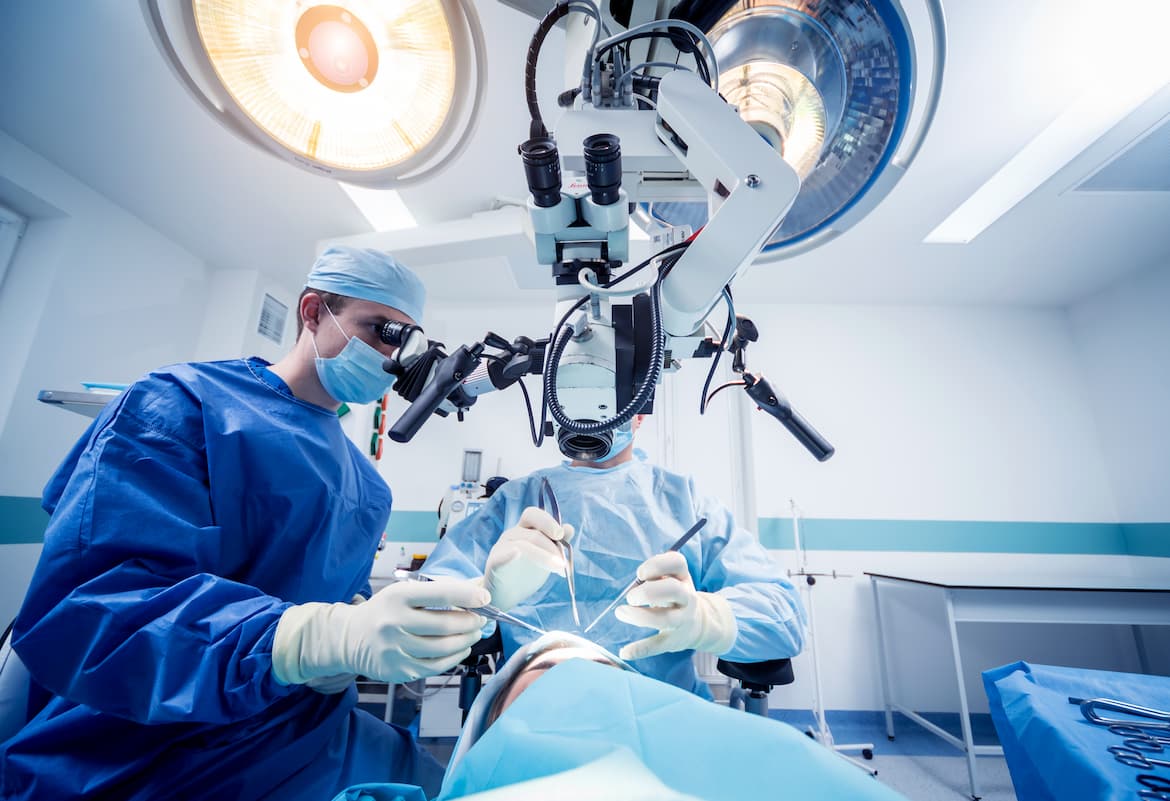Neurology Treatment in Turkey
Healthy Türkiye helps you find the best neurology treatment in Turkey at affordable prices and adopts a 360-degree service approach in all areas of health through affiliated hospitals.
- Homepage
- Medical Treatment
- Neurology Treatment in Turkey

About Neurology Treatment in Turkey
Neurology treatment in Turkey is a branch of medical treatment that deals with central nervous system disorders and peripheral nerves. Neurology is needed to learn the root cause of the symptoms, which are almost the same in most diseases, and to make a correct diagnosis. In neurological studies conducted in Turkey, six symptoms as chronic and severe headache, dizziness, numbness and tingling, chronic pain, movement problems, and memory problems are very important for early diagnosis and treatment.
Neurology is a very broad field in Turkey and has various sub-sections such as pediatric neurology, epilepsy, general neurology, memory disorders, neuropsychology, multiple sclerosis, neurology-stroke, neuroimmunology, neurocritical, neuromuscular disorders, neuro-oncology, Parkinson’s and movement disorders, vascular diseases there are various sub-branches such as.
Neurology treatment in Turkey generally starts with the recognition of the diagnosis and the nature of the disorder. If you are referred to neurology for assessment, you will usually be seen by a neurologist who may need to carry out tests to confirm the diagnosis.
At Healthy Türkiye, our neurologists may refer you to psychotherapy but will also consider other therapy options such as physiotherapy or occupational therapy, which may or may not happen alongside psychotherapy. Occasionally medications may be considered, especially when there are additional signs of depression or anxiety.

Sub-branches of Neurology in Turkey
Child Neurology: Child neurology in Turkey; EEG, MRI, Spinal tap, and blood tests with seizures and epilepsy, muscle problems that may cause weakness, headaches, attention-deficit/hyperactivity disorder, behavioral disorder including Tourette syndrome, sleep problems, autism, delayed speech-coordination, cerebral It diagnoses and treats palsy, mental disability, congenital malformations, stroke and traumatic brain injury, genetic conditions affecting the nervous system, autoimmune problems, brain tumors, and infectious diseases.
Epilepsy: Epilepsy is a neurological disorder in which brain activity becomes abnormal, causing seizures, unconscious behaviors, sensory problems, and sometimes loss of consciousness. The symptoms of epilepsy seizures can vary greatly from person to person. To be diagnosed with epilepsy, you usually need to have at least two unprovoked seizures with no known trigger, occurring at least 24 hours apart. After epilepsy is diagnosed, lifelong treatment may be necessary for some people, although most patients can control the seizure with medication or sometimes, rarely, surgery.
General Neurology: General neurology looks for signs of problems affecting the central and peripheral nervous system and diagnoses and treats neurological conditions such as concussion, neck and back pain, neuropathy, and vertigo.
Memory Disorders and Neuropsychology: Memory disorders are caused by damage to certain parts of the brain, and reduced and inhibited ability to store or recall memories. In addition, memory impairment affects cognitive abilities and social behavior, language, problem-solving skills, and the ability to perform simple tasks. They can vary in severity from mild to severe, progressive, and urgent. There are types of memory impairment neuropsychology such as Alzheimer’s disease, vascular dementia, Lewy body dementia, frontotemporal dementia, mild personal disorder, and mixed dementia.
Multiple Sclerosis and Neuroimmunology: It has been determined that multiple sclerosis, which is usually diagnosed between the ages of 20 and 40, is caused by the effect of environmental and genetic factors without a single cause. The body’s immune system mistakenly attacks the fatty substance called myelin around the nerves, causing damage to the attack. If it is not given properly, it causes the body to lose its motor function.
Neuromuscular Disorder: Some neuromuscular disorders are genetically inherited or caused by mutations. Symptoms such as muscle weakness, spasms, and pain occur as a result of the effects of the nerves controlling the muscles. Although there is no cure for many neuromuscular diseases, they can be kept under control.
Neuro-oncology: Neuro-oncology determines the neurological complications of brain and spine tumors and cancer. The biggest factor in the emergence of the disease is radiation.
Parkinson’s And Movement Disorder: Parkinson’s disease affects cells in one part of the brain, causing cell loss. The main symptoms of Parkinson’s disease are tremors, slow movements, and stiffness. Therapies, medications, and sometimes brain surgery to help with movement problems are common treatments for Parkinson’s disease.
Vascular Neurological Stroke: Vascular Neurology examines stroke that occurs when blood vessels in the brain and spinal cord are affected. Stroke is brain damage resulting from interruption of blood flow or bleeding in the brain, such as weakness, numbness, vision changes, and speech impairment.
Neurocritical Care: It is an intensive care unit for patients with neurological and spinal cord injuries.

We Care About Your Health
Healthy Türkiye provides the best for your health and comfort. You will feel privileged with us.
7/24 Quality Personal Assistance Throughout Your Journey
Customizable for You All-Inclusive Packages
Get the Right Advice for your Health
Types of Neurology Treatment in Turkey
Neurology Treatment for Disorders
Neurology treatments for disorders are the central and peripheral nervous system, including the brain, spinal cord, cranial nerves, peripheral nerves, nerve roots, autonomic nervous system, neuromuscular junction, and muscles. Common disorders of the nervous system include:
Epilepsy is a neurological disorder associated with abnormal electrical activity in the brain, causing recurrent, unprovoked seizures and loss of consciousness.
Alzheimer’s disease is progressive mental deterioration that is caused by generalized degeneration of the brain.
A stroke occurs when a blood vessel is prevented from delivering oxygen and nutrients to the brain, due to a blood clot or rupture.
Migraine (and other headache disorders) is a severe, reoccurring headache often paired with nausea and disturbed vision.
Multiple Sclerosis is a chronic disease involving damage to nerve cells in the brain and spinal cord characterized by numbness, speech and muscular impairment, blurred vision, and severe fatigue.
Parkinson’s disease is a progressive disease marked by tremors, muscular rigidity, and slow, imprecise movement. It is associated with degeneration of the basal ganglia of the brain and dopamine deficiency.
Brain tumors are a mass of abnormal cells in the brain, leading to impaired cognitive function.
Brain trauma is an injury to the brain from an outside force, sometimes leading to an altered state of consciousness, and permanent or temporary impairment of cognitive, physical, or psychosocial functions.
Tourette’s syndrome is a neurological disorder, coupled with involuntary tics and vocalizations, as well as the compulsive exclamation of obscenities.
Amyotrophic Lateral Sclerosis (ALS, Lou Gehrig’s Disease) is a progressive deterioration of the motor neurons of the central nervous system, leading to muscular atrophy and paralysis.
Neurology Treatment for Diseases
A neurologist will treat diseases that attack the nervous system, like infections (bacterial, viral, fungal) and cancers (malignant, being)
Neurological diseases and disorders are common in the world, and the risk of developing one increases with age. Also, neurologic disorders, such as injury of the nervous system, are a common occurrence. Research shows that as many as 60 million people worldwide can suffer a traumatic brain injury each year. It is important to know the symptoms of neurological diseases and disorders, as they are serious and may be life-threatening when left untreated.

Tests for Neurology Treatment in Turkey
Different functions of the nervous system are tested by a neurologist during the examination in Turkey. Types of testing depend on symptoms, but most neurological exams include testing for some or all of the following:
Mental State Test
Coordination and Balance Test
Reflex Test
Emotion Test
Cranial Nerves Test
Autonomic Nervous System Test
In Turkey, common neurologic tests include:
Angiography: Angiography can show if blood vessels in your brain, head, or neck are blocked, damaged, or abnormal, also, it can detect such things as aneurysms and blood clots.
Biopsy: A biopsy is the removal of a piece of tissue from the body. Biopsies can be taken of muscle, nerve, or brain tissue.
Cerebrospinal fluid analysis: This test involves the removal of a sample of the fluid that surrounds the brain and spinal cord. Cerebrospinal fluid analysis can detect a brain bleed, infection, multiple sclerosis, and metabolic diseases.
Electroencephalography (EEG): This test measures your brain’s electrical activity and is used to help diagnose seizures and infections brain injury and tumors.
Electromyography (EMG): EMG records the electrical activity in muscles and is used to diagnose nerve and muscle disorders, spinal nerve root compression, and motor neuron disorders such as amyotrophic lateral sclerosis.
Electronystagmography (ENG): This group of tests can be used to diagnose involuntary eye movement, dizziness, and balance disorders.
Evoked potentials: This test measures how quickly electrical signals reach your brain from your eyes, ears, or touch to your skin. The test can help diagnose multiple sclerosis, acoustic neuroma, and spinal cord injury.
Myelography: This test can helps diagnose spinal and spinal cord tumors and herniated disks and fractures.
Polysomnogram: This test can measure brain and body activity during sleep and helps diagnose sleep disorders.
Positron emission tomography (PET): This imaging method can show tumors or be used to evaluate epilepsy, brain tumors, dementia, and Alzheimer’s disease.
Single-photon emission computed tomography (SPECT): This imaging test can diagnose tumors, and infections and assess the location of seizures, degenerative spine disease, and stress fractures.
Thermography: SPECT measures temperature changes within your body or specific organs and is used to evaluate pain syndromes, peripheral nerve disorders, and nerve root compression.
Prepare for Neurology Treatment in Turkey
It helps to prepare for your neurology treatment consultation in Turkey:
Write down your symptoms and other health information, including medications, allergies, previous illnesses, and your family’s history of the disease.
Make a list of your questions.
Have your previous test results sent to the neurologist, or take them with you.
Bring a friend or family member to make sure you don’t miss anything.
The neurologist will probably give you a lot of information, so you can want to take notes. Don’t be afraid to ask questions if you’re confused about something. You should make sure you understand your diagnosis and treatment and any further steps you need to take.
After this initial examination, a neurologist may then perform several assessments, like:
Cranial nerve tests: These test brain nerve function, which might affect the senses. People can need to identify certain scents and identify letters or numbers in an eye test.
Coordination and motor skills tests: A neurologist might ask people to spin around, move their limbs in a specific way, tap their fingers, or write. People can also have a reflex test, such as a tap on their knee to check the response.
Sensation tests: A neurologist may check how well people respond to stimuli, such as soft fabric or touching containers holding warm/cold water.
Cognitive ability tests: A neurologist might ask people about their job, the date, and the time of year to check people’s memory, also, language and math tests can test for concentration. Some tests of cognitive skill, such as the mini-mental state examination (MMSE) or the Montreal Cognitive Assessment (MoCA), are not standard, but a neurologist might perform them if a person is showing signs of cognitive impairment during the neurological evaluation.

Types of Neurology Disease in Turkey
There are various types of neurology successfully performed in Turkey and Healthy Türkiye serves you find the best option.
Vagus Nerve Stimulation
Pediatric Neurology
Headache & Facial Pain
Cubital tunnel syndrome
Sleep disorders
Neuroncology
ALS & Neuromuscular Disorders
Neuropsychology
MS treatment
Parkinson’s Disease
Symptoms, Effects, and Causes of Neurological Problems in Turkey
Healthy Türkiye collaborates with patients and determines the healthiest and safest weight loss surgery method for them. Finding the right procedure requires a discussion between you and your bariatric surgeon. “We consider the patient’s history, conditions, and expectations. Then we come up with a plan together,” says our medical experts. The method you will determine with Healthy Türkiye is the most suitable method for you.
Neurological disorders are diseases that affect the brain, autonomic, and central nervous systems.
There are reasons such as infection, genetics, nutrition, lifestyle, environmental effects, and physical injury in the formation of neurological disorders.
The symptoms of neurological disorders that occur can range from emotional or physical symptoms, depending on the type and the area of the body affected.
Partial or complete paralysis, muscle weakness, partial or complete loss of sensation, seizures, poor cognitive abilities, difficulty reading and writing, persistent pain, and decreased sleep are the most common physical manifestations of neurological disorders.
While most patients often look for physical symptoms in themselves, it is important to understand that neurological problems can also have emotional symptoms such as depression and delusions.
Neurological disorders can lead to a number of serious consequences when left untreated. The short- and long-term effects of a neurological imbalance can vary greatly depending on the disorder and the severity of your condition. That’s why early diagnosis and prompt treatment are paramount in neurology.
2026 Cost of Neurology Treatment in Turkey
All types of medical like neurology treatment are very affordable in Turkey. Many factors are also included in determining the cost of neurology treatment in Turkey. Your process with Healthy Türkiye will last from the time you decide to have neurology treatment in Turkey until the time you are fully recovered even if you are back home. The exact neurology treatment procedure cost in Turkey depends on the type of operation involved.
The cost of neurology treatment in Turkey does not demonstrate many variations in 2026. Compared to costs in developed countries like the United States or the UK, neurology treatment costs in Turkey are relatively low. So, it’s no wonder patients from across the world visit Turkey for neurology treatment procedures. However, the price is not the only factor affecting choices. We suggest looking for hospitals that are safe and have neurology treatment reviews on Google. When people decide to seek medical help for neurology treatment, they will not only have low-cost procedures in Turkey, but also the safest and best treatment.
At clinics or hospitals contracted with Healthy Türkiye, patients will receive the best neurology treatment from specialist doctors in Turkey at affordable rates. Healthy Türkiye teams to provide medical attention neurology treatment procedures and high-quality treatment to patients at a minimum cost. When you contact Healthy Türkiye assistants, you can get free information about the cost of neurology treatment in Turkey and what this cost covers.
Why Choose Turkey for Neurology Treatment?
In Turkey, neurologists partner with experts in many specialties to provide you with comprehensive care. Our team includes doctors trained in brain and nervous system surgery, tumors of the brain and nervous system, brain and nervous system imaging, mental health conditions, sleep disorders, molecular diagnostics, speech conditions, eye conditions, pain medicine, physical medicine, and rehabilitation, or other medical and surgical specialties.
A team of specialists will listen to your needs and evaluate your condition from every angle before developing an individualized neurology treatment plan in line with your goals. Your test results are available quickly, and appointment schedules are coordinated. What might take months elsewhere can often be done in days at Healthy Türkiye. Additionally, the clinic has dozens of telestroke sites across the country, bringing neurological expertise to regions where few if any neurologists are located.
Turkey offers the latest in neurological care with innovative therapies, new techniques, and clinical trials developed by our world-class experts. Also, Turkey neurologists help more than 100,000 adults and children each year, including those with complex or rare conditions. Healthy Türkiye’s treatment of neurology is one of the largest and most comprehensive neurological practices in the world. It includes more than 200 experts trained in diagnosing and treating people with epilepsy, aneurysms, spinal Bifida, movement disorders, dementias, stroke, brain tumors, multiple sclerosis, headache, neuromuscular diseases, peripheral nerve tumors, paralysis, nerve pain, sleep disorders, speech disorders, and many other conditions.
All-Inclusive Packages for Neurology Treatment in Turkey
Healthy Türkiye offers all-inclusive packages for neurology treatment in Turkey at much lower prices. Extremely professional and experienced doctors and technicians carry out high-quality neurology treatment. The cost of neurology treatment in European countries can be quite expensive, especially in the UK. Healthy Türkiye provides cheap all-inclusive packages for a long and short stay of neurology treatment in Turkey. Because of many factors, we can provide you with many opportunities for your neurology treatment in Turkey.
The price of neurology treatment differs from other countries due to medical fees, staff labor prices, exchange rates, and market competition. You can save much more in neurology treatment compared to other countries in Turkey. When you purchase a neurology treatment all-inclusive package with Healthy Türkiye our healthcare team will present hotels for you to choose from. In neurology treatment travel, you will have the price of your stay included in the all-inclusive package cost.
In Turkey, when you purchase neurology treatment all-inclusive packages through Healthy Türkiye, you will always receive VIP transfers. These are provided by Healthy Türkiye, which is contracted with highly qualified hospitals for neurology treatment in Turkey. Healthy Türkiye teams will organize everything about neurology treatment for you and have you picked up from the airport and safely brought to your accommodation.
Once settled in the hotel, you will be transferred to and from the clinic or hospital for neurology treatment. After your neurology treatment has been successfully completed, the transfer team will return you to the airport in time for your flight home. In Turkey, all packages of neurology treatment can be arranged upon request, which relaxes the minds of our patients.
The Best Hospitals in Turkey for Neurology Treatment
The best hospitals in Turkey for neurology treatment are Healthy Türkiye, Memorial Hospital, Acıbadem International Hospital, and Medicalpark Hospital. These hospitals attract patients from all over the world seeking neurology treatment due to their affordable prices and high success rates.
Best Doctors and Surgeons in Turkey for Neurology Treatment
The best doctors and surgeons in Turkey for neurology treatment are highly skilled professionals who offer specialized care and advanced procedures. With their expertise and state-of-the-art techniques, these specialists ensure that patients receive high-quality neurology treatment and achieve optimal health results.

Frequently Asked Questions
Depression is a neurological disease associated with the dysfunction of certain brain regions.
For neurons in the brain, this is not an easy question to answer. Yet there are three types of neurons in the spinal cord sensory, motor, and interneurons.
Headache is one of the most common neurological disorders and there is a wide variety of headaches such as migraine, cluster headaches, and tension-type.
Although the specific causes of neurological problems vary, genetic disorders, congenital abnormalities, infection, lifestyle including malnutrition, environment, brain damage, spinal cord injury, or nerve injury are the most effective causes.
The primary recommended treatment is medication. It cares for stroke, traumatic brain injury, and other conditions. Physical or occupational therapy treatment is recommended for rehabilitation from neurological conditions.
Neurological disorders are linked to psychological and social factors and often cause psychological symptoms, while mental disorder is a neurological disease.
Headaches are one of the most common neurological disorders and there are a variety of different kinds of headaches, such as migraines, cluster headaches, and tension headaches
Physicians cannot cure many neurological disorders, but rehabilitation can assist in treating symptoms and the restoration of daily functioning.
Frequently the neurologist will recommend electrodiagnostic testing to measure the electrical activity of muscles and nerves. If necessary, the neurologist may also recommend a nerve biopsy, a spinal tap, or magnetic resonance imaging (MRI)
Researchers believe that high anxiety may cause nerve firing to occur more often. This may make you feel tingling, burning, and other sensations that are also associated with nerve damage and neuropathy. Anxiety can also cause muscles to cramp up, which can also be related to nerve damage.
